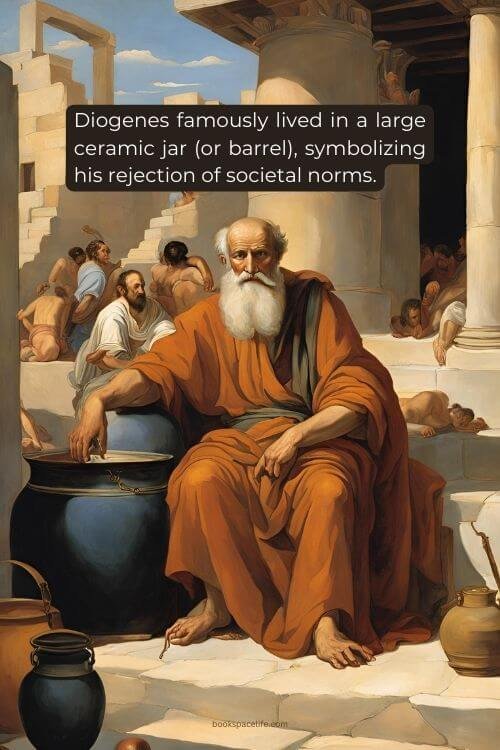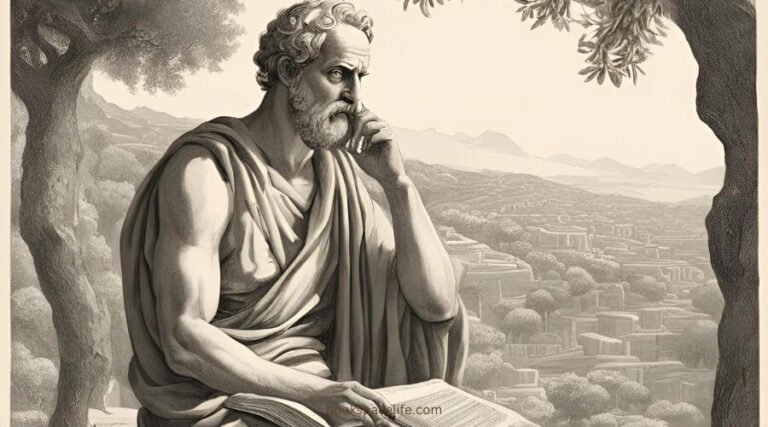Thales of Miletus
Diogenes of Sinope: The Iconoclast Philosopher and Founder of Cynicism
Diogenes of Sinope (412 – 323 BCE) is perhaps one of the most colorful and provocative figures in ancient philosophy.
A central figure in the school of Cynicism, he is known for his ascetic lifestyle and his disdain for societal norms, wealth, and superficiality.
His life and philosophy challenge conventional wisdom and offer a radical critique of the values of his time.
This blog post delves into Diogenes’ early life, travels, education, philosophical contributions, and his enduring influence on Western thought.
Quick Read
Table of Contents
(1) Early Life and Education
Diogenes was born in Sinope, a Greek city on the Black Sea, around 412 or 404 BCE. His exact birth date remains uncertain, but he was the son of a wealthy banker.
According to some accounts, his family faced political trouble, leading them to leave Sinope.
This tumultuous beginning seems to have influenced Diogenes’ perspective on wealth and societal status.
His education is less well-documented, but it is believed that he received a traditional Greek education, studying under the Cynic philosopher Antisthenes, a student of Socrates.
This connection to Socratic thought likely shaped Diogenes’ philosophical outlook, emphasizing the importance of virtue over material wealth and the pursuit of self-sufficiency.

(2) Travels and Influence
Diogenes traveled extensively throughout Greece, including Athens, where he became a well-known figure.
He is often associated with the Athenian philosophical scene, where he encountered other thinkers and engaged in debates about morality, ethics, and the nature of happiness.
His travels also took him to Corinth, where he met Alexander the Great. According to legend, when Alexander offered to grant Diogenes any wish, he famously replied, “Yes, stand out of my sunlight.”
This encounter encapsulates Diogenes’ disdain for authority and material wealth, reinforcing his belief that true happiness comes from living in accordance with nature rather than societal conventions.
(3) Philosophical Contributions
Diogenes’ philosophy is primarily associated with Cynicism, a school of thought that advocates for living in accordance with nature and rejecting the artificial constructs of society. His ideas can be summarized in several key themes:
- Living According to Nature: Diogenes believed that humans should live in harmony with nature and reject the constraints imposed by society. He argued that civilization corrupts individuals and leads them away from their natural instincts. By embracing a simple and ascetic lifestyle, he sought to demonstrate the importance of self-sufficiency and authenticity.
- Critique of Materialism: One of Diogenes’ most famous philosophies is his critique of materialism and wealth. He often went about Athens with a lantern, claiming to be searching for an honest man, highlighting his belief that virtue and truth were rare in a society obsessed with wealth and status. His rejection of material possessions and emphasis on living a life of virtue served as a powerful critique of the values of his contemporaries.
- Ascetic Lifestyle: Diogenes is perhaps best known for his extreme asceticism. He lived in a large ceramic jar (not a barrel, as is often misreported) and owned very few possessions. This lifestyle was a direct challenge to the materialistic values of Athenian society and served as a radical example of self-sufficiency and independence.
- Emphasis on Autonomy: Diogenes advocated for personal autonomy and freedom from societal norms. He believed that true happiness could only be attained by freeing oneself from the expectations and constraints of society. This perspective resonates with modern ideas of individualism and self-expression, emphasizing the importance of authenticity and personal integrity.
- Provocative Behavior: Diogenes was known for his eccentric and provocative behavior, often using wit and humor to challenge the conventions of his time. He would engage in public acts that shocked the citizens of Athens, such as defecating in public or interrupting speeches to expose hypocrisy. This behavior was not merely for shock value; it served as a powerful means of illustrating his philosophical points and challenging societal norms.

(4) Influence and Impact
Diogenes’ influence extends beyond his immediate philosophical contributions, impacting various areas of thought and culture:
- Cynicism as a Philosophical Movement: Diogenes is often considered one of the founders of Cynicism, a movement that emphasizes the rejection of societal norms and the pursuit of virtue. His ideas laid the groundwork for later Cynics, such as Crates of Thebes, who further developed the philosophy and its emphasis on living in accordance with nature.
- Influence on Stoicism: The Stoics, who followed in the tradition of Cynicism, were influenced by Diogenes’ ideas about virtue, self-sufficiency, and the importance of living in harmony with nature. Stoicism emphasized rationality and the cultivation of virtue, drawing on the principles espoused by Diogenes and his contemporaries.
- Legacy in Literature and Popular Culture: Diogenes has left a lasting mark on literature and popular culture. His witty sayings and anecdotes have been recorded in various works, influencing later writers and thinkers. He is often depicted as a figure of wisdom and humor, embodying the spirit of the philosopher who challenges societal norms.
- Modern Philosophical Discourse: Diogenes’ ideas continue to resonate in contemporary discussions of individualism, authenticity, and the critique of consumer culture. His rejection of materialism and emphasis on self-sufficiency offer a counterpoint to the modern obsession with wealth and status, prompting individuals to reevaluate their values and priorities.
- Symbol of Philosophical Freedom: Diogenes represents the archetype of the free-thinking philosopher, unafraid to challenge authority and societal norms. His life and philosophy serve as a reminder of the importance of questioning assumptions and seeking truth, encouraging individuals to embrace their autonomy and authenticity.
(5) Conclusion
Diogenes of Sinope remains a compelling and provocative figure in the history of philosophy. His rejection of societal norms, critique of materialism, and emphasis on living in accordance with nature challenge us to rethink our values and priorities.
Through his eccentric lifestyle and sharp wit, he embodied the spirit of Cynicism, offering a radical alternative to the conventions of his time.
As we reflect on Diogenes’ life and philosophy, we recognize the enduring relevance of his ideas in today’s world.
In an age marked by consumerism and societal pressures, his teachings remind us of the importance of authenticity, self-sufficiency, and the pursuit of virtue.
Diogenes’ legacy as a philosopher of freedom and a champion of individualism continues to inspire those who seek to live lives true to themselves, challenging us to confront the conventions that often dictate our choices.
Ultimately, Diogenes of Sinope serves as a powerful symbol of the philosophical quest for truth and the courage to live authentically, encouraging us to embrace our individuality and pursue a life guided by virtue and integrity.
(A) 7 Quick Facts on Diogenes of Sinope
- Born in Sinope – Diogenes was born around 412 BCE in Sinope, a city on the Black Sea.
- Traveled to Athens – He moved to Athens, where he became a prominent figure of the Cynic philosophy.
- Influenced by Antisthenes – Diogenes was a student of Antisthenes, the founder of Cynicism, adopting his ascetic lifestyle.
- Lived in a Barrel – He famously lived in a large ceramic jar (or barrel), symbolizing his rejection of societal norms.
- Advocated for Simplicity – Diogenes preached the importance of living simply and in accordance with nature.
- Renowned for Wit – He was known for his sharp wit and paradoxical behavior, often using humor to critique society.
- Met Alexander the Great – Diogenes famously encountered Alexander, dismissing him and stating he wanted “only the sun.”
(B) 10 Quotes attributed to Diogenes of Sinope
- I am looking for an honest man. Reflecting his skepticism about the integrity of others as he famously searched with a lantern in daylight.
- Dogs and philosophers do the greatest good and get the fewest rewards. Comparing the virtue of philosophers and dogs, both overlooked despite their value.
- He has the most who is most content with the least. Advocating for minimalism and the Cynic ideal of self-sufficiency.
- I threw my cup away when I saw a child drinking from his hands. Illustrating his commitment to living with only the bare necessities.
- Blushing is the color of virtue. Suggesting that modesty and humility are virtues worth embodying.
- When I die, throw me to the wolves. I am used to it. Highlighting his indifference to conventional burial and his rejection of social norms.
- Of what use is a philosopher who doesn’t hurt anybody’s feelings? Arguing that philosophers should challenge others, not just comfort them.
- The sun, too, shines on the dung heap and is not polluted. Emphasizing that purity lies in the soul, unaffected by external surroundings.
- I am not insane; I just have different values than you. Defending his lifestyle, which rejected conventional society, as a choice, not madness.
- I do not possess wealth; it possesses me. Critiquing the enslaving nature of material wealth, central to Cynic philosophy.








